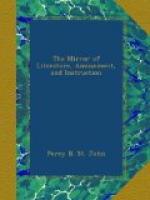* * * * *
In the separation that had now taken place (1820) between Count Guiccioli and his wife, it was one of the conditions that the lady should, in future, reside under the paternal roof:—in consequence of which, Madame Guiccioli, on the 16th of July, left Ravenna and retired to a villa belonging to Count Gamba, about fifteen miles distant from that city. Here Lord Byron occasionally visited her—about once or twice, perhaps, in the month—passing the rest of his time in perfect solitude. To a mind like his, whose world was within itself, such a mode of life could have been neither new nor unwelcome; but to the woman, young and admired, whose acquaintance with the world and its pleasures had but just begun, this change was, it must be confessed, most sudden and trying. Count Guiccioli was rich, and, as a young wife, she had gained absolute power over him. She was proud, and his station placed her among the highest in Ravenna. They had talked of travelling to Naples, Florence, Paris,—and every luxury, in short, that wealth could command was at her disposal.
All this she now voluntarily and determinedly sacrificed for Byron. Her splendid home abandoned—her relations all openly at war with her—her kind father but tolerating, from fondness, what he could not approve—she was now, upon a pittance of 200_l_. a year, living apart from the world, her sole occupation the task of educating herself for her illustrious lover, and her sole reward the few brief glimpses of him which their now restricted intercourse allowed. Of the man who could inspire and keep alive so devoted a feeling, it may be pronounced with confidence that he could not have been such as, in the freaks of his own wayward humour, he represented himself; while, on the lady’s side, the whole history of her attachment goes to prove how completely an Italian woman, whether by nature or from her social position, is led to invert the usual course of such frailties among ourselves, and, weak in resisting the first impulses of passion, to reserve the whole strength of her character for a display of constancy and devotedness afterwards.
* * * * *
MEETING OF LORD BYRON AND MR. MOORE AT VENICE.
It was my good fortune, at this period, (1819) in the course of a short and hasty tour through the north of Italy, to pass five or six days with Lord Byron at Venice. I had written to him on my way thither to announce my coming, and to say how happy it would make me could I tempt him to accompany me as far as Rome.




